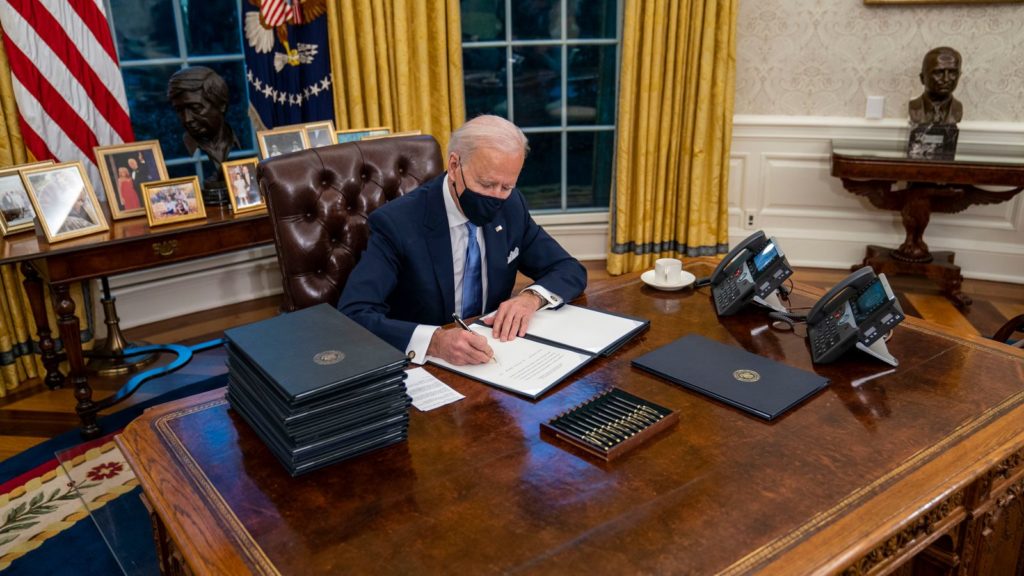Australia/Israel Review
Editorial: Biden has much to do
Jan 27, 2021 | Colin Rubenstein

President Joe Biden’s inauguration brought with it a sea change in American politics, and the new Administration, bolstered by a slim majority in both houses of Congress, has the capacity to significantly change the policies of outgoing president Donald Trump.
This is as it should be – it is what democratic elections are for. Yet the new Administration would be well advised to try not to throw the baby out with the bathwater when establishing new policies.
President Trump left office in utter disgrace, especially due to his conduct in inciting the violent attack on the Capitol building on Jan. 6, and his ongoing refusal to accept the clear results of a free and fair election.
Yet it would be self-destructive if the Biden Administration were to repudiate those parts of Trump’s policies that were working well and serving American interests, in spite of calls from some within the Democratic Party to do just that.
Trump’s move to recognise Jerusalem as Israel’s capital and relocate the US Embassy to Israel there and his recognition of Israeli sovereignty on the Golan Heights have re-grounded US policy on Israel and the Palestinians in realism. His refusal to fund the politicised UN Palestinian refugee agency UNRWA shone a spotlight on the unsustainable way the world panders to Palestinian efforts to perpetuate the conflict.
And the Trump Administration’s breakthrough Abraham Accords, brokering peace between Israel and several Arab and Muslim nations, have transformed the Middle East for the better, in a way not seen since Egyptian President Anwar Sadat visited Jerusalem in 1977.
As Bret Stephens makes clear in this AIR (pp. 15-20), American interests dictate that the Biden Administration should continue vigorously trying to extend the Abraham Accords and other peace and normalisation deals between Israel and the Arab and Muslim world.
It should also pursue a reality-based approach to dealing with the Palestinian issue, including recognising inevitable adjustments to the pre-1967 armistice lines in accordance with peace plans negotiated over the past two decades.
The Administration should also recognise that while resumption of some sort of Israeli-Palestinian talks may be possible, the conditions that prevented any final agreement in the past persist, so any major breakthrough looks very unlikely indeed.
On the issue of Iran, the Trump Administration was right to evaluate the 2015 nuclear agreement, known as the Joint Comprehensive Plan of Action (JCPOA), as a “bad deal”. The decision to withdraw the US from the arrangement and seek to build “maximum pressure” to renegotiate the deal by reimposing harsh sanctions has not yet borne fruit. Yet it leaves the Biden Administration well positioned to hopefully negotiate a much better arrangement, provided it does not let scorn for Trump’s legacy impede a realistic assessment of current US interests and options with respect to Iran.
The exposure of Iran’s nuclear archive in 2018 and its ever-growing litany of violations of the JCPOA have put an end to the charade that its nuclear program was ever peaceful. Now Iran is increasing its stockpile of 20% enriched uranium, which is technically most of the way to military-grade, by a kilo every two days. Iran has also begun building an assembly line for the production of uranium metal, a substance which is used to stabilise the warhead of a nuclear weapon.
Surely President Biden and his team must recognise that the situation has changed drastically since Biden was part of the Obama Administration’s ill-advised focus on entrenching, defending and preserving the deeply flawed JCPOA at almost any cost.
As expert analyst Michael Rubin notes in this issue, the Trump Administration’s sanctions program had brought the Iranian regime to its knees financially. Teheran is talking tough and making threatening moves because it is desperate for a lifeline in the form of sanctions relief.
President Biden, who has promised to have the US re-join the JCPOA while at the same time working to “improve and extend” the nuclear deal, should not rush to provide one.
Rather, Biden should recognise that time is not on Iran’s side, and make it clear the onus is on Iran to return to full compliance with the JCPOA before any substantive sanctions relief can take place.
Meanwhile, he and his team can consult allies and pause to review the Iranian situation with fresh eyes. They should formulate a clear policy strategy to do what the JCPOA did not – genuinely foreclose a military nuclear option for Iran for the foreseeable future, and also limit and deter Iran’s other ongoing rogue behaviours, especially its support for terrorism and subversion across the Middle East.
Furthermore, following the appointment of several officials closely associated with negotiating the original JCPOA to positions of influence, such as Deputy Secretary of State Wendy Sherman, CIA Director William Burns and National Security Advisor Jake Sullivan, Biden would be wise to seek counsel on the subject from fresh-thinking, impartial advisors with no vested interest in the JCPOA.
Of course, as America struggles to pull itself out of the morass of the COVID-19 pandemic, there are naturally other priorities vying for the White House’s attention.
The keystone of American power is its democratic unity and purpose, and little can be achieved without healing the painful rifts which afflict the United States and finding the cohesion and consensus required to move forward. Biden has a personality that can assist in this regard, if he does not allow the more extreme, angry and shrill elements of his party to dominate political discourse in Washington.
The US is too important to global order for the Biden Administration to keep its focus overwhelmingly domestic. Biden and his team simply have much to do abroad, as well as at home. Australians should wish him every success, for the sake of our own interests, as well as out of a longstanding sense of comradeship and friendship with our US allies.
Tags: Iran, Israel, Joe Biden, Middle East, Palestinians, United States






